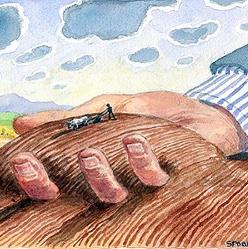Farm Bankruptcies and Land Grabbing Worldwide

(Paris, June 21, 2011) Hundreds of civil society organisations (CSOs), including farmers’ movements, women’s groups and non-governmental organisations, will launch a global appeal against farmland grabbing during the G20 meeting on Agriculture in Paris on June 22 and 23.
Over 500 organizations from around the world (1) have joined the “Dakar Appeal Against Land Grabbing” that was originally drawn up at the World Social Forum in Dakar last February (2).
While agriculture ministers from the world’s 20 richest countries are discussing what to do about food price volatility and the growing hunger crisis, millions of hectares of fertile land, along with their water resources, are being grabbed from peasants, pastoralists, herders, fisherfolk, indigenous peoples and traditional healers to be converted into massive agribusiness operations by private investors who want to produce food supplies or agro-fuels for international markets. As a consequence, millions of peasant families and other rural and indigenous folk are being thrown off their lands and deprived of their livelihoods.
During a major academic conference on land grabbing earlier this year in Brighton, UK, research studies of over 100 cases of “large scale land investments” were presented. They generally show no positive effects for local communities (3). On the contrary, in many cases people are being evicted and pushed into poverty.
In the Dakar Appeal, being handed over to the French Government chairing the G20, major CSOs are calling upon governments to immediately cease all massive land grabs and return the plundered land to communities. At the moment the G20 facilitates land grabbing by supporting RAI (referred to as PRAI in the draft G20 text).
The organisations call on the UN Committee on World Food Security (CFS) to definitively reject the World Bank-driven principles for Responsible Agricultural Investment (RAI) which are illegitimate and cannot bring equity to land grabbing, and to develop effective mandatory guidelines for land tenure that respect and protect peoples’ rights especially the right to food. Instead an inclusive process at CFS should be launched on what kind of investments are needed to support small holder food producers.
The petition states that national governments and international institutions should guarantee peoples’ rights to land instead of signing leases with big private investors. Sustainable family farming, agro ecological production models and strong local markets are recognized by many as the best way to feed people and to protect the planet.
Contact persons in Paris:
- Geneviève Savigny – Confédération paysanne/European Coordination La Via campesina +33-625551687
- Romario Rosetto – La Via Campesina Brazil +33-625551687
- Antoine Bouhey – Peuples Solidaires/ActionAid, +33-1-48582185
- Jeanne Moreen Jorand – CCFD +33-1-44828000
(1) List of signatures here: http://farmlandgrab.org/post/view/18827
(2) Read the petition here: http://farmlandgrab.org/post/view/18827
(3) see http://www.future-agricultures.org/index.php?option=com_content&view=category&layout=blog&id=1547&Itemid=978

